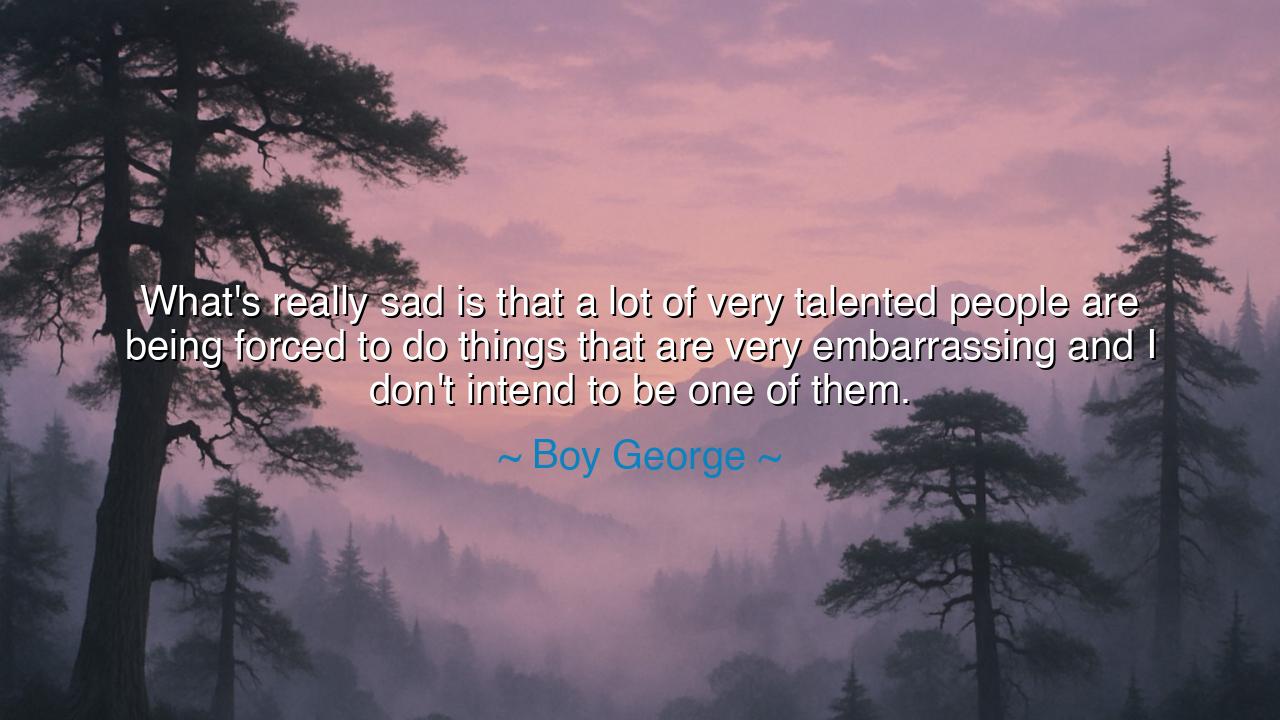
What's really sad is that a lot of very talented people are being
What's really sad is that a lot of very talented people are being forced to do things that are very embarrassing and I don't intend to be one of them.






Hear, O seekers of dignity and truth, the words of Boy George, a soul who walked through the fires of fame and the illusions of glory, and who declared with boldness: “What’s really sad is that a lot of very talented people are being forced to do things that are very embarrassing and I don’t intend to be one of them.” In this utterance is the cry of the artist against the chains of commerce, against the humiliation of bending to forces that would strip away integrity for fleeting gain. It is a vow of self-preservation, a shield raised against the world’s demand that talent serve vanity instead of truth.
The meaning of this saying is both lament and defiance. Boy George sees the tragedy of gifted souls—singers, actors, creators—who, instead of offering their talents freely, are compelled by industry, by money, by desperation, to betray their artistry. Their work becomes a spectacle of shame rather than a song of truth. Yet in the same breath, he draws a line in the sand: I do not intend to be one of them. His words call forth courage: the courage to refuse degradation, to protect the sacred spark of one’s gift, even if it means sacrifice.
History itself resounds with examples of this battle. Consider Vincent van Gogh, who lived in poverty and obscurity because he refused to shape his art into something fashionable and marketable. He could have bent his genius into forms that pleased buyers, but he chose the lonely road of integrity. Though mocked in his life, he became immortal in death, for he was never forced into the embarrassment of betraying his vision. By contrast, countless artists in history have altered their voices, their brushstrokes, their performances, not for truth but for survival, leaving behind works that fade because they were born not of courage but of compromise.
Think too of the gladiators of Rome, many of them men of strength, grace, and skill. Their talents, however, were enslaved to the bloodlust of the crowd. They were compelled to use their gifts in spectacles that degraded their humanity. They were not free to honor their talent, but were forced into embarrassment by a system that valued entertainment over dignity. Boy George’s lament is the modern echo of this ancient tragedy: when talent becomes ensnared in the machinery of spectacle, the soul of the artist is diminished.
Yet the saying also points us to a higher path. True artistry—whether in music, painting, writing, or any form of human creation—is sacred. It should uplift, inspire, and reveal the depths of human experience. To safeguard it requires strength: the strength to say no, the strength to endure hardship rather than surrender dignity, the strength to preserve authenticity even when the world clamors for compromise. Boy George reminds us that the artist must sometimes choose between applause and self-respect, and that the greater crown is integrity.
The lesson is clear: protect your gift. Do not let the hunger for approval or wealth force you into acts that betray your spirit. What seems like success bought with shame will sour, but integrity remains eternal. Better to stand alone with your truth than to bow before the world in falsehood. For talent is not given to us to be wasted on humiliation, but to reveal beauty, courage, and meaning.
As for practical action, examine carefully the demands placed upon you in your own work and life. Ask yourself: Does this honor my gift, or does it diminish me? Have the courage to decline what degrades you, even if it costs you in the short term. Surround yourself with those who encourage your authenticity, not those who profit from your compromise. And if you must struggle, let it be the noble struggle of one who guards their dignity rather than the hollow ease of one who sells it.
Thus, Boy George’s words endure as a vow of the artist to himself and as a teaching for us all: do not be forced into embarrassment, but stand in integrity. For in the end, the world forgets the humiliations, but it remembers the truth. And the one who refuses to betray their gift will shine long after the applause has faded.






AAdministratorAdministrator
Welcome, honored guests. Please leave a comment, we will respond soon